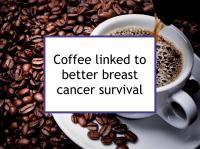Coffee and black tea drinking have been reported to have either small positive or small negative associations with breast cancer risk, or no association at all. For example, a large 2020 prospective study of postmenopausal women found no association between caffeinated or decaffeinated coffee intake and breast cancer risk.
However, few studies have examined the influence of coffee or tea drinking after diagnosis on breast cancer-specific survival. Now a major new study which followed participants for up to 30 years has reported that consuming more than three cups per day of coffee is associated with 25% lower risk of breast cancer-specific death.
Best coffee preparations
Large population studies tend to mask individual differences in risk that may be caused by a variety of factors. Below are some findings concerning coffee preparation and risk of breast cancer that may also be relevant to risk of recurrence.
- Decaffeinated coffee is less chemopreventive than regular coffee — one study reported that women who drank decaffeinated coffee exclusively did not have significantly different risk of breast cancer than women who sometimes drank decaffeinated or who did not drink any type of coffee.
- Acrylamide levels are higher in light roasts compared to darker roasts. Most studies that have examined the association between acrylamide and breast cancer have reported no link or inconclusive results. However, there may be a threshold level above which acrylamide increases risk. For example, a 2020 study reported that breast cancer risk increased in proportion to with acrylamide intake once it reached 20 μg/day (approximately seven 8-oz cups) among premenopausal women.
- Acrylamide levels are also higher in instant coffee compared to coffee made from roasted beans. One Hong Kong study reported that while there was no association between overall coffee drinking and breast cancer risk, women who consumed instant coffee experienced significantly increased risk.
- Like other canned goods, canned coffee or tea can be a source of bisphenol A (BPA). One study reported that significant levels of BPA were introduced into breast milk after consuming canned coffee.
- Aluminum moka pots have been shown to introduce meaningful amounts of aluminum (a breast carcinogen) into coffee during brewing and should be avoided.
Coffee and caffeine during treatment
Moderate to high coffee consumption has been found to be associated with reduced risk of early recurrence in tamoxifen-treated patients.
On the other hand, coffee, tea and other sources of caffeine should be avoided during treatment with doxorubicin and other anthracycline chemotherapy since they might reduce its effectiveness. There is also some preliminary evidence that coffee could lower the effectiveness of paclitaxel and other taxane chemotherapy as a result of its caffeic acid content.
High levels of caffeine intake have been associated with higher risk of osteoporosis and therefore should be limited by many women taking aromatase inhibitors. This depends on whether bone mineral density is low or has been decreasing as a result of aromatase inhibitor treatment.
Latest research links coffee to better survival
The study referenced above was designed to investigate the associations between coffee and tea consumption after diagnosis and all-cause and breast cancer-specific mortality. The study included a total of 8,900 women with stage I–III breast cancer who participated in the Nurses’ Health Study (NHS: 1980 — 2010; NHSII: 1991 — 2011). A validated food frequency questionnaire was administered every four years to determine coffee and tea intake. A total of 2,501 deaths occurred during the study period of up to 30 years, of which 1,054 were from breast cancer.
Coffee consumption was found to be associated with lower breast cancer-specific mortality. Those drinking over three cups per day experienced a 25% lower risk of death from breast cancer compared to non-drinkers. Coffee drinkers also experienced lower all-cause mortality. Tea drinkers experienced similar lower all-cause mortality, but did not have a lower risk of breast cancer-specific death.
The authors conclude that higher coffee consumption after diagnosis was associated with better breast cancer and overall survival in this population. Higher tea consumption appeared to be linked to better overall survival.
